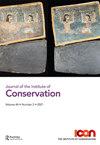Conservation science, conservation practice and the conservator’s knowledge: a naïve exploration
IF 1
0 HUMANITIES, MULTIDISCIPLINARY
引用次数: 2
Abstract
Abstract Science has contributed to improving and transforming conservation in many different ways such that conservation might be understood as a scientific activity in itself, or at least as a science-driven activity. However, there are both theoretical and practical problems with any such belief including things like the limits of inductive knowledge, the unrepresentativeness of samples and the disjunction of reality inherent to the scientific paradigm. Perhaps more importantly, there are many areas in conservation practice that fall beyond the purview of science as they can only be successfully approached by resorting to a kind of knowledge (or intuition, or skill) that is unique to conservators. The relevance of this knowledge can be demonstrated by carefully examining the questions that a practising conservator needs to answer when performing a conservation treatment.保护科学、保护实践和保护工作者的知识:naïve探索
摘要科学以许多不同的方式为改善和转变保护做出了贡献,因此保护本身可以被理解为一项科学活动,或者至少是一项科学驱动的活动。然而,任何这样的信念都存在理论和实践问题,包括归纳知识的局限性、样本的不代表性和科学范式固有的现实脱节。也许更重要的是,保护实践中有许多领域超出了科学的范畴,因为只有依靠保护人员特有的知识(或直觉或技能)才能成功地解决这些问题。通过仔细检查执业保育员在进行保育处理时需要回答的问题,可以证明这些知识的相关性。
本文章由计算机程序翻译,如有差异,请以英文原文为准。
求助全文
约1分钟内获得全文
求助全文
来源期刊

Journal of the Institute of Conservation
HUMANITIES, MULTIDISCIPLINARY-
CiteScore
1.50
自引率
0.00%
发文量
22
期刊介绍:
The Journal of the Institute of Conservation is the peer reviewed publication of the Institute of Conservation (Icon). As such, its aims reflect those of Icon, to advance knowledge and education in conservation and achieve the long term preservation and conservation of moveable and immoveable cultural heritage. The Journal provides a collective identity for conservators; it promotes and supports both the profession and professionalism. With international contributions on all aspects of conservation, it is an invaluable resource for the heritage sector. The specific aims of the Journal are to: 1. promote research, knowledge and understanding of cultural heritage conservation through its history, practice and theory 2. provide an international forum to enable and disseminate advances in research, knowledge and understanding relating to conservation and heritage 3. champion and support professional standards of heritage conservation in the UK and internationally 4. provide a permanent record of issues relating to conservation and heritage 5. be financially and operationally sustainable. To achieve these aims, the Journal invites contributions from all those involved in the conservation of cultural heritage and related activities. Areas of interest include understanding cultural heritage materials and their degradation; subject reviews and histories of cultural heritage materials and conservation treatments; new, innovative or improved approaches to conservation and collections care theory, practice, communication, management and training; case studies demonstrating new, innovative or improved approaches; and conservation in its wider context. Submitters are encouraged to demonstrate how their work is of practical application to conservation. To maintain professional standards and promote academic rigour, submissions of articles and shorter notices are subject to an anonymous peer review process.
 求助内容:
求助内容: 应助结果提醒方式:
应助结果提醒方式:


